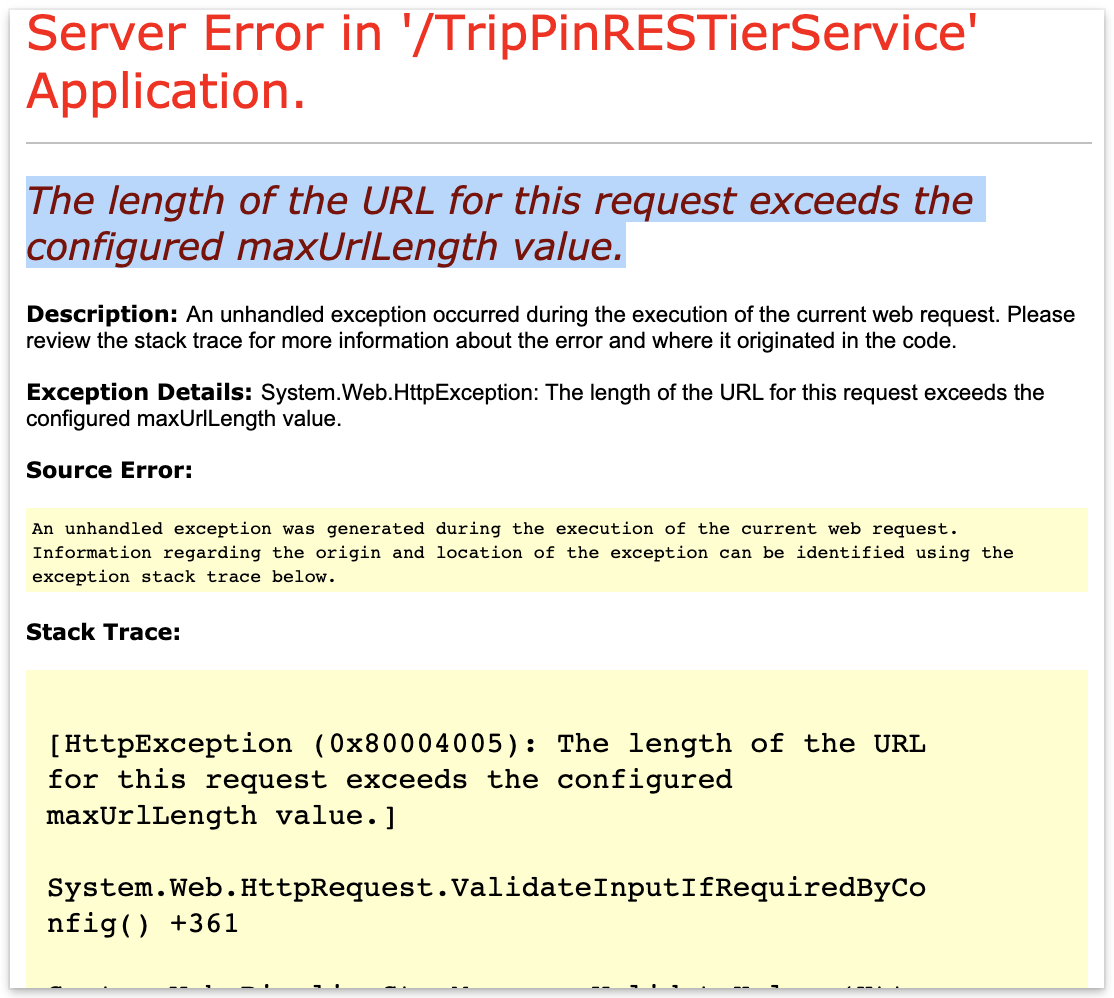A fluent API for querying, creating, updating and deleting OData resources in Angular. OData service for Angular.
Please check also my other related project, OData Angular Generator
Full examples of the library:
Install from npm:
npm i angular-odataImport ODataModule into your application module definition and setup the module for the serviceRootUrl.
import { NgModule } from '@angular/core';
import { ODataModule } from 'angular-odata';
@NgModule({
imports: [
...
ODataModule.forRoot({
config: {
serviceRootUrl: 'https://services.odata.org/V4/(S(4m0tuxtnhcfctl4gzem3gr10))/TripPinServiceRW/'
}
})
...
]
})
export class AppModule {}Use OData Angular Generator for generate the <Api>Config and the <Api>Module definition.
Import ODataModule, <Api>Config and <Api>Module into your application module. Setup ODataModule with <Api>Config and import it along with <Api>Module.
import { NgModule } from '@angular/core';
import { ODataModule } from 'angular-odata';
import { TripPinConfig, TripPinModule } from './trippin';
@NgModule({
imports: [
...
ODataModule.forRoot({ config: TripPinConfig }),
TripPinModule
]
...
})
export class AppModule {}Inject and use the ODataServiceFactory
import { Component } from "@angular/core";
import { ODataClient, ODATA_ETAG } from "angular-odata";
@Component({
selector: "app-root",
templateUrl: "./app.component.html",
styleUrls: ["./app.component.css"],
})
export class AppComponent {
title = "TripPin";
constructor(private factory: ODataServiceFactory) {
this.queries();
}
queries() {
// Use OData Service Factory
let airportsService = this.factory.entitySet<Airport>(
"Airports",
"Microsoft.OData.SampleService.Models.TripPin.Airport"
);
let airports = airportsService.entities();
// Fetch airports
airports.fetch().subscribe(({ entities }) => {
console.log("Airports: ", entities);
});
// Fetch airports with count
airports
.fetch({ withCount: true })
.subscribe(({ entities, annots }) =>
console.log("Airports: ", entities, "Annotations: ", annots)
);
// Fetch all airports
airports
.fetchAll()
.subscribe((airports) => console.log("All Airports: ", airports));
// Fetch airport with key and fetch again from cache
airports
.entity("CYYZ")
.fetch()
.pipe(
switchMap(() =>
// From Cache!
airports.entity("CYYZ").fetch({ fetchPolicy: "cache-first" })
)
)
.subscribe(({ entity, annots }) =>
console.log("Airport: ", entity, "Annotations: ", annots)
);
// Clone airports resource and filter new resource
airports
.clone()
.query((q) =>
q.filter({ Location: { City: { CountryRegion: "United States" } } })
)
.fetch()
.subscribe(({ entities, annots }) =>
console.log(
"Airports of United States: ",
entities,
"Annotations: ",
annots
)
);
// Change query definition of airports resource and fetch again
airports.query((q) =>
q.filter().push({ Location: { City: { Region: "California" } } })
);
airports
.fetch()
.subscribe(({ entities, annots }) =>
console.log(
"Airports in California: ",
entities,
"Annotations: ",
annots
)
);
// Store airports resource
var json = airports.toJson();
// Load airports resource
airports = this.odata.fromJson(json) as ODataEntitySetResource<Airport>;
// Change query definition of airports resource and fetch again
airports.query((q) => q.filter().clear());
airports
.fetch()
.subscribe(({ entities, annots }) =>
console.log("Airports: ", entities, "Annotations: ", annots)
);
let peopleService = this.factory.entitySet<Person>(
"People",
"Microsoft.OData.SampleService.Models.TripPin.Person"
);
let people = peopleService.entities();
// Clone people resource and expand and fetch
people
.clone()
.query((q) =>
q.expand({
Friends: {
expand: { Friends: { select: ["AddressInfo"] } },
},
Trips: { select: ["Name", "Tags"] },
})
)
.fetch({ withCount: true })
.subscribe(({ entities, annots }) =>
console.log(
"People with Friends and Trips: ",
entities,
"Annotations: ",
annots
)
);
// Clone people resource and filter with expressions
people
.clone()
.query((q) =>
q.filter(({ e }) =>
e().eq("Emails", "[email protected]").or(e().eq("UserName", "john"))
)
)
.fetch()
.subscribe(({ entities, annots }) =>
console.log(
"People with Friends and Trips: ",
entities,
"Annotations: ",
annots
)
);
this.odata
.batch("TripPin")
.exec(() =>
forkJoin({
airports: airports.fetch(),
people: people.fetch({ withCount: true }),
})
)
.subscribe();
}
}The library works mainly with OData Version 4, however, it incorporates basic support for versions 3 and 2.
For a deep query customizations the library use odata-query and odata-filter-builder as a builders.
The api documentation is generated using compodoc and can be viewed here: https://diegomvh.github.io/angular-odata/docs/
Library documentation can be viewed on the wiki here: https://github.com/diegomvh/angular-odata/wiki














